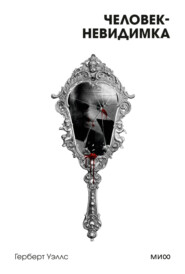По всем вопросам обращайтесь на: info@litportal.ru
(©) 2003-2024.
✖
The Country of the Blind, and Other Stories
Настройки чтения
Размер шрифта
Высота строк
Поля
"Or smile," said Gibberne, with his eye on the lady's answering teeth.
"It's infernally hot, somehow," said I, "Let's go slower."
"Oh, come along!" said Gibberne.
We picked our way among the bath-chairs in the path. Many of the people sitting in the chairs seemed almost natural in their passive poses, but the contorted scarlet of the bandsmen was not a restful thing to see. A purple-faced little gentleman was frozen in the midst of a violent struggle to refold his newspaper against the wind; there were many evidences that all these people in their sluggish way were exposed to a considerable breeze, a breeze that had no existence so far as our sensations went. We came out and walked a little way from the crowd, and turned and regarded it. To see all that multitude changed to a picture, smitten rigid, as it were, into the semblance of realistic wax, was impossibly wonderful. It was absurd, of course; but it filled me with an irrational, an exultant sense of superior advantage. Consider the wonder of it! All that I had said, and thought, and done since the stuff had begun to work in my veins had happened, so far as those people, so far as the world in general went, in the twinkling of an eye. "The New Accelerator – " I began, but Gibberne interrupted me.
"There's that infernal old woman!" he said.
"What old woman?"
"Lives next door to me," said Gibberne. "Has a lapdog that yaps. Gods! The temptation is strong!"
There is something very boyish and impulsive about Gibberne at times. Before I could expostulate with him he had dashed forward, snatched the unfortunate animal out of visible existence, and was running violently with it towards the cliff of the Leas. It was most extraordinary. The little brute, you know, didn't bark or wriggle or make the slightest sign of vitality. It kept quite stiffly in an attitude of somnolent repose, and Gibberne held it by the neck. It was like running about with a dog of wood. "Gibberne," I cried, "put it down!" Then I said something else. "If you run like that, Gibberne," I cried, "you'll set your clothes on fire. Your linen trousers are going brown as it is!"
He clapped his hand on his thigh and stood hesitating on the verge. "Gibberne," I cried, coming up, "put it down. This heat is too much! It's our running so! Two or three miles a second! Friction of the air!"
"What?" he said, glancing at the dog.
"Friction of the air," I shouted. "Friction of the air. Going too fast.
Like meteorites and things. Too hot. And, Gibberne! Gibberne! I'm all over pricking and a sort of perspiration. You can see people stirring slightly.
I believe the stuff's working off! Put that dog down."
"Eh?" he said.
"It's working off," I repeated. "We're too hot and the stuff's working off! I'm wet through."
He stared at me, then at the band, the wheezy rattle of whose performance was certainly going faster. Then with a tremendous sweep of the arm he hurled the dog away from him and it went spinning upward, still inanimate, and hung at last over the grouped parasols of a knot of chattering people. Gibberne was gripping my elbow. "By Jove!" he cried, "I believe it is! A sort of hot pricking and – yes. That man's moving his pocket-handkerchief! Perceptibly. We must get out of this sharp."
But we could not get out of it sharply enough. Luckily, perhaps! For we might have run, and if we had run we should, I believe, have burst into flames. Almost certainly we should have burst into flames! You know we had neither of us thought of that… But before we could even begin to run the action of the drug had ceased. It was the business of a minute fraction of a second. The effect of the New Accelerator passed like the drawing of a curtain, vanished in the movement of a hand. I heard Gibberne's voice in infinite alarm. "Sit down," he said, and flop, down upon the turf at the edge of the Leas I sat – scorching as I sat. There is a patch of burnt grass there still where I sat down. The whole stagnation seemed to wake up as I did so, the disarticulated vibration of the band rushed together into a blast of music, the promenaders put their feet down and walked their ways, the papers and flags began flapping, smiles passed into words, the winker finished his wink and went on his way complacently, and all the seated people moved and spoke.
The whole world had come alive again, was going as fast as we were, or rather we were going no faster than the rest of the world. It was like slowing down as one comes into a railway station. Everything seemed to spin round for a second or two, I had the most transient feeling of nausea, and that was all. And the little dog, which had seemed to hang for a moment when the force of Gibberne's arm was expended, fell with a swift acceleration clean through a lady's parasol!
That was the saving of us. Unless it was for one corpulent old gentleman in a bath-chair, who certainly did start at the sight of us, and afterwards regarded us at intervals with a darkly suspicious eye, and, finally, I believe, said something to his nurse about us, I doubt if a solitary person remarked our sudden appearance among them. Plop! We must have appeared abruptly. We ceased to smoulder almost at once, though the turf beneath me was uncomfortably hot. The attention of every one – including even the Amusements' Association band, which on this occasion, for the only time in its history, got out of tune – was arrested by the amazing fact, and the still more amazing yapping and uproar caused by the fact, that a respectable, over-fed lapdog sleeping quietly to the east of the bandstand should suddenly fall through the parasol of a lady on the west – in a slightly singed condition due to the extreme velocity of its movements through the air. In these absurd days, too, when we are all trying to be as psychic, and silly, and superstitious as possible! People got up and trod on other people, chairs were overturned, the Leas policeman ran. How the matter settled itself I do not know – we were much too anxious to disentangle ourselves from the affair and get out of range of the eye of the old gentleman in the bath-chair to make minute inquiries. As soon as we were sufficiently cool and sufficiently recovered from our giddiness and nausea and confusion of mind to do so we stood up, and skirting the crowd, directed our steps back along the road below the Metropole towards Gibberne's house. But amidst the din I heard very distinctly the gentleman who had been sitting beside the lady of the ruptured sunshade using quite unjustifiable threats and language to one of those chair-attendants who have "Inspector" written on their caps: "If you didn't throw the dog," he said, "who did?"
The sudden return of movement and familiar noises, and our natural anxiety about ourselves (our clothes were still dreadfully hot, and the fronts of the thighs of Gibberne's white trousers were scorched a drabbish brown), prevented the minute observations I should have liked to make on all these things. Indeed, I really made no observations of any scientific value on that return. The bee, of course, had gone. I looked for that cyclist, but he was already out of sight as we came into the Upper Sandgate Road or hidden from us by traffic; the char-à-banc, however, with its people now all alive and stirring, was clattering along at a spanking pace almost abreast of the nearer church.
We noted, however, that the window-sill on which we had stepped in getting out of the house was slightly singed, and that the impressions of our feet on the gravel of the path were unusually deep.
So it was I had my first experience of the New Accelerator. Practically we had been running about and saying and doing all sorts of things in the space of a second or so of time. We had lived half an hour while the band had played, perhaps, two bars. But the effect it had upon us was that the whole world had stopped for our convenient inspection. Considering all things, and particularly considering our rashness in venturing out of the house, the experience might certainly have been much more disagreeable than it was. It showed, no doubt, that Gibberne has still much to learn before his preparation is a manageable convenience, but its practicability it certainly demonstrated beyond all cavil.
Since that adventure he has been steadily bringing its use under control, and I have several times, and without the slightest bad result, taken measured doses under his direction; though I must confess I have not yet ventured abroad again while under its influence. I may mention, for example, that this story has been written at one sitting and without interruption, except for the nibbling of some chocolate, by its means. I began at 6.25, and my watch is now very nearly at the minute past the half-hour. The convenience of securing a long, uninterrupted spell of work in the midst of a day full of engagements cannot be exaggerated. Gibberne is now working at the quantitative handling of his preparation, with especial reference to its distinctive effects upon different types of constitution. He then hopes to find a Retarder, with which to dilute its present rather excessive potency. The Retarder will, of course, have the reverse effect to the Accelerator; used alone it should enable the patient to spread a few seconds over many hours of ordinary time, and so to maintain an apathetic inaction, a glacier-like absence of alacrity, amidst the most animated or irritating surroundings. The two things together must necessarily work an entire revolution in civilised existence. It is the beginning of our escape from that Time Garment of which Carlyle speaks. While this Accelerator will enable us to concentrate ourselves with tremendous impact upon any moment or occasion that demands our utmost sense and vigour, the Retarder will enable us to pass in passive tranquillity through infinite hardship and tedium. Perhaps I am a little optimistic about the Retarder, which has indeed still to be discovered, but about the Accelerator there is no possible sort of doubt whatever. Its appearance upon the market in a convenient, controllable, and assimilable form is a matter of the next few months. It will be obtainable of all chemists and druggists, in small green bottles, at a high but, considering its extraordinary qualities, by no means excessive price. Gibberne's Nervous Accelerator it will be called, and he hopes to be able to supply it in three strengths: one in 200, one in 900, and one in 2000, distinguished by yellow, pink, and white labels respectively.
No doubt its use renders a great number of very extraordinary things possible; for, of course, the most remarkable and, possibly, even criminal proceedings may be effected with impunity by thus dodging, as it were, into the interstices of time. Like all potent preparations, it will be liable to abuse. We have, however, discussed this aspect of the question very thoroughly, and we have decided that this is purely a matter of medical jurisprudence and altogether outside our province. We shall manufacture and sell the Accelerator, and as for the consequences – we shall see.
XXVIII.
THE TRUTH ABOUT PYECRAFT
He sits not a dozen yards away. If I glance over my shoulder I can see him. And if I catch his eye – and usually I catch his eye – it meets me with an expression —
It is mainly an imploring look – and yet with suspicion in it.
Confound his suspicion! If I wanted to tell on him I should have told long ago. I don't tell and I don't tell, and he ought to feel at his ease. As if anything so gross and fat as he could feel at ease! Who would believe me if I did tell?
Poor old Pyecraft! Great, uneasy jelly of substance! The fattest clubman in London.
He sits at one of the little club tables in the huge bay by the fire, stuffing. What is he stuffing? I glance judiciously, and catch him biting at a round of hot buttered teacake, with his eyes on me. Confound him! – with his eyes on me!
That settles it, Pyecraft! Since you will be abject, since you will behave as though I was not a man of honour, here, right under your embedded eyes, I write the thing down – the plain truth about Pyecraft. The man I helped, the man I shielded, and who has requited me by making my club unendurable, absolutely unendurable, with his liquid appeal, with the perpetual "don't tell" of his looks.
And, besides, why does he keep on eternally eating?
Well, here goes for the truth, the whole truth, and nothing but the truth!
Pyecraft – . I made the acquaintance of Pyecraft in this very smoking-room. I was a young, nervous new member, and he saw it. I was sitting all alone, wishing I knew more of the members, and suddenly he came, a great rolling front of chins and abdomina, towards me, and grunted and sat down in a chair close by me and wheezed for a space, and scraped for a space with a match and lit a cigar, and then addressed me. I forget what he said – something about the matches not lighting properly, and afterwards as he talked he kept stopping the waiters one by one as they went by, and telling them about the matches in that thin, fluty voice he has. But, anyhow, it was in some such way we began our talking.
He talked about various things and came round to games. And thence to my figure and complexion. "You ought to be a good cricketer," he said. I suppose I am slender, slender to what some people would call lean, and I suppose I am rather dark, still – I am not ashamed of having a Hindu great-grandmother, but, for all that, I don't want casual strangers to see through me at a glance to her. So that I was set against Pyecraft from the beginning.
But he only talked about me in order to get to himself.
"I expect," he said, "you take no more exercise than I do, and probably you eat no less." (Like all excessively obese people he fancied he ate nothing.) "Yet" – and he smiled an oblique smile – "we differ."
And then he began to talk about his fatness and his fatness; all he did for his fatness and all he was going to do for his fatness; what people had advised him to do for his fatness and what he had heard of people doing for fatness similar to his. "A priori," he said, "one would think a question of nutrition could be answered by dietary and a question of assimilation by drugs." It was stifling. It was dumpling talk. It made me feel swelled to hear him.
One stands that sort of thing once in a way at a club, but a time came when I fancied I was standing too much. He took to me altogether too conspicuously. I could never go into the smoking-room but he would come wallowing towards me, and sometimes he came and gormandised round and about me while I had my lunch. He seemed at times almost to be clinging to me. He was a bore, but not so fearful a bore as to be limited to me and from the first there was something in his manner – almost as though he knew, almost as though he penetrated to the fact that I might– that there was a remote, exceptional chance in me that no one else presented.
"I'd give anything to get it down," he would say – "anything," and peer at me over his vast cheeks and pant. Poor old Pyecraft! He has just gonged; no doubt to order another buttered teacake!
He came to the actual thing one day. "Our Pharmacopoeia," he said, "our
Western Pharmacopoeia, is anything but the last word of medical science.
In the East, I've been told – "
He stopped and stared at me. It was like being at an aquarium.
I was quite suddenly angry with him. "Look here," I said, "who told you about my great-grandmother's recipes?"
"Well," he fenced.
"Every time we've met for a week," I said – "and we've met pretty often – you've given me a broad hint or so about that little secret of mine."
"Well," he said, "now the cat's out of the bag, I'll admit, yes, it is so.
I had it – "

















